Denver Waldorf Teacher Spotlight - David Johnson
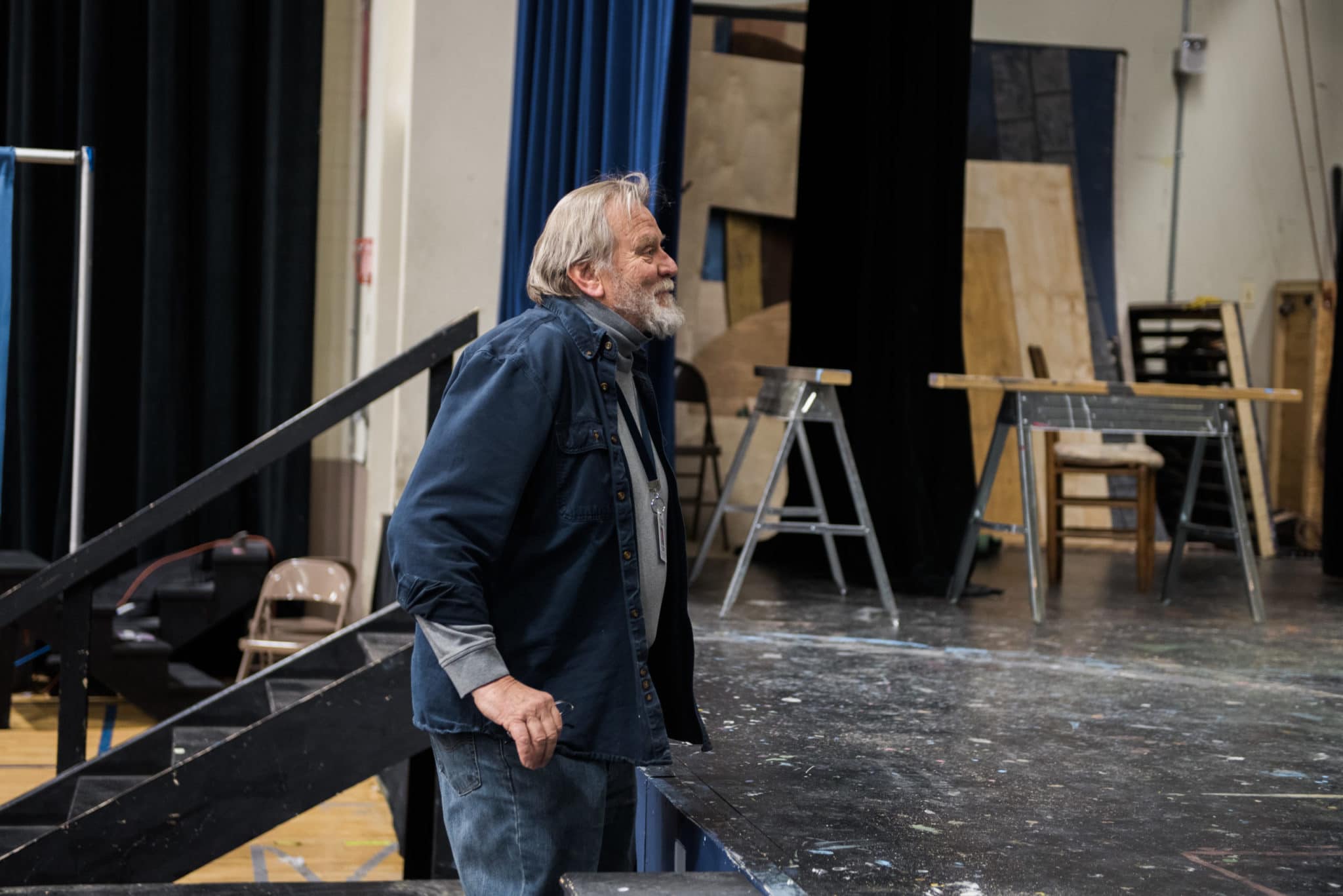
When students at The Denver Waldorf School are asked what they love about their education, they often comment that they treasure close relationships with teachers. DWS students are full of gratitude to be surrounded by caring, dedicated and inspiring teachers.
Our Teacher Spotlight series highlights a teacher each month, and this month, let’s get to know David Johnson. David has been a shining light in our community for almost 20 years and has decided to retire at the end of this school year. What an understatement it is to say that we wish him well and that he will be dearly missed.
What grades and subjects do you teach?
I teach high school drama, both technical work (sets and lighting) and direction. I assist and teach the lower grades for the technical aspects of their plays.
What is your educational background?
I have a BA in Theatre and Radio/Television from Ashland College (now Ashland University) in Ashland, Ohio.
What were the next stops on your journey prior to coming to The Denver Waldorf School?
I spent 15 years working in summer stock theatre, regional theatre, Broadway and Off-Broadway scene shops and theatres. I did regional tours throughout Michigan and New York state. I toured around the world with New York-based dance companies. I spent 14 years working for an educational foundation in upstate New York. I spent 10 years working on Rudolf Steiner’s Mystery Dramas in Spring Valley, New York. I also started a small theatre group with parents and alumni at the Green Meadow Waldorf School.
How many years have you taught at The Denver Waldorf School?
I started teaching at the beginning of the 2002-03 school year.
What drew you to the Waldorf curriculum?
I am a lifer. I attended the Rudolf Steiner School in New York for 7th- 9th grades, High Mowing School in Wilton, New Hampshire for 10th grade, and Die Freie Waldorf Schule in Stuttgart, Germany for 11th and 12th Grades. My three children attended the Green Meadow Waldorf School.
What is your teaching philosophy and approach?
My philosophy of teaching drama in high school is to give the students an exposure to another form of art. All art forms that are in a Waldorf school curriculum engage the imagination and allow a student to express her or himself. In the fine arts, such as clay, painting, woodwork, copper work, etc. the hand is engaged, working in coordination with the eye. This hand/eye coordination coupled with the imagination is vital. In drama, the whole body is in use. The limbs are moving, the ear is listening, the lungs and jaw are speaking. The soul is interacting with the characters and with the story that is being told. In drama, not only does the student have to be one with the character, but with all the other characters on stage at the same time, and also the ones waiting in the wings. This helps the student grow into themselves as they witness what a playwright wishes to express and to grow in relation with the rest of the world.
The Waldorf philosophy of education focuses on the whole child. What does this mean to you?
Just what the statement says: the WHOLE child. Of course, we have to define the whole child. The child is an incarnated being that brings to the world strengths and weaknesses that need to be encouraged and supported as they grow to be whole adults. The Waldorf curriculum is built around the progressive inner development that a child experiences, starting in early childhood and running through 12th grade in high school. The education should be diverse and complete enough that the student will leave school with the fundamental inner and outer tools, ready to enter the greater world to explore and do what ever she or he wants to pursue, in freedom. The education is not just college prep, nor is it just a basic ABCs education. It should educate the thinking, feeling, and willing, i. e. the WHOLE child, in equal parts, delivered at the appropriate times.
What makes The Denver Waldorf School unique?
Traditionally, the main lesson is taught with one and a half to two hours devoted to a subject for three to four weeks. After the time is up, teachers and students move on to a new subject. The moving away from a subject, even for a full year, allows the subject to rest and “live” within the child’s thinking. This is where ideas can live deep in the child, forming concepts that can then be perceived later. It is not unlike breathing. This is how most American Waldorf schools do this. DWS does this also with afternoon track classes, what other Waldorf schools call skills classes. The students are allowed to breath in the art classes and then they are “let go” and given the opportunity to grow within the students.
DWS is collecting comments about the the impact of David’s teaching career – if you have a thought or a story to share, please email communicate@denverwaldorf.org.
Many heartfelt thanks to David for his dedication to the growth of our students.
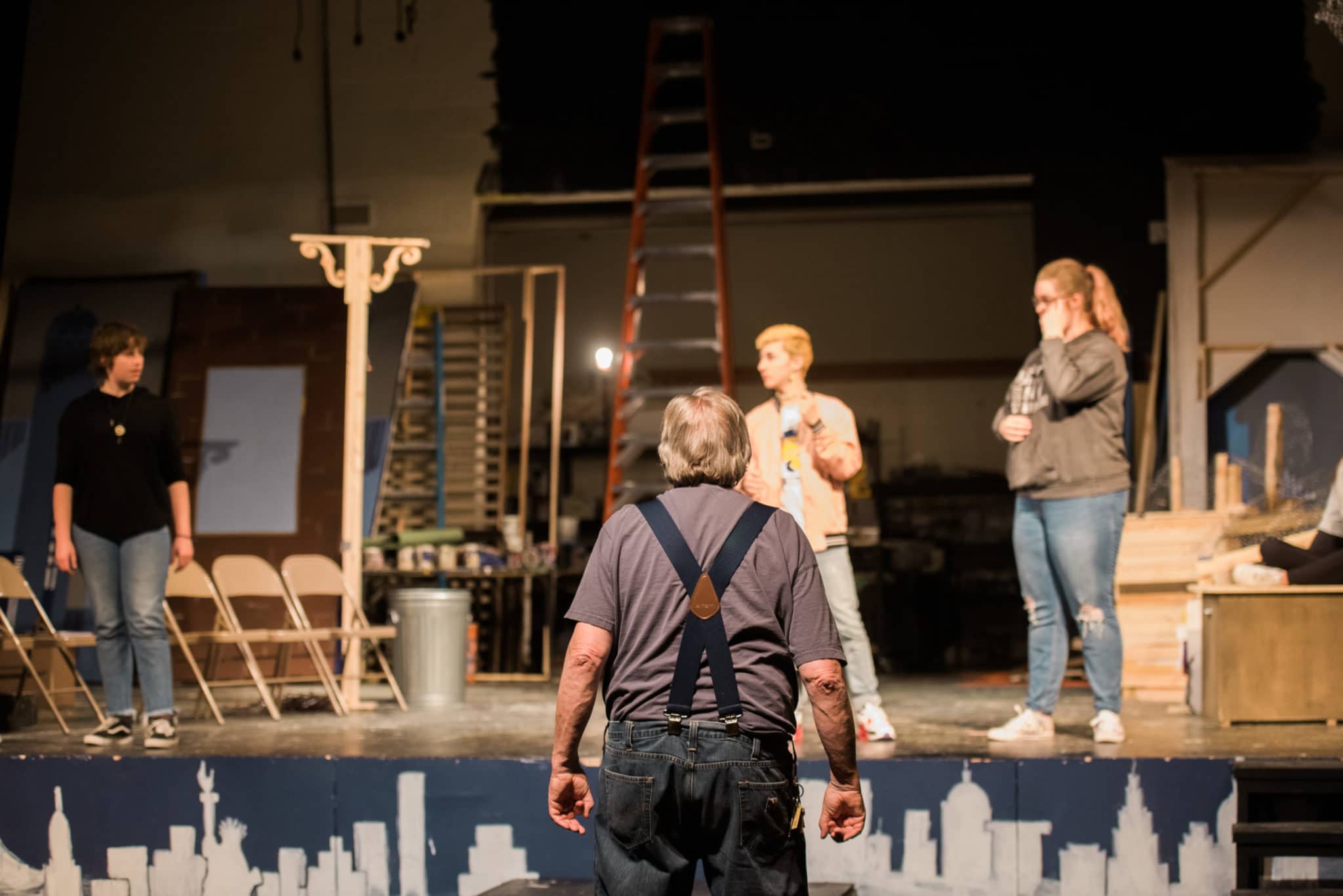
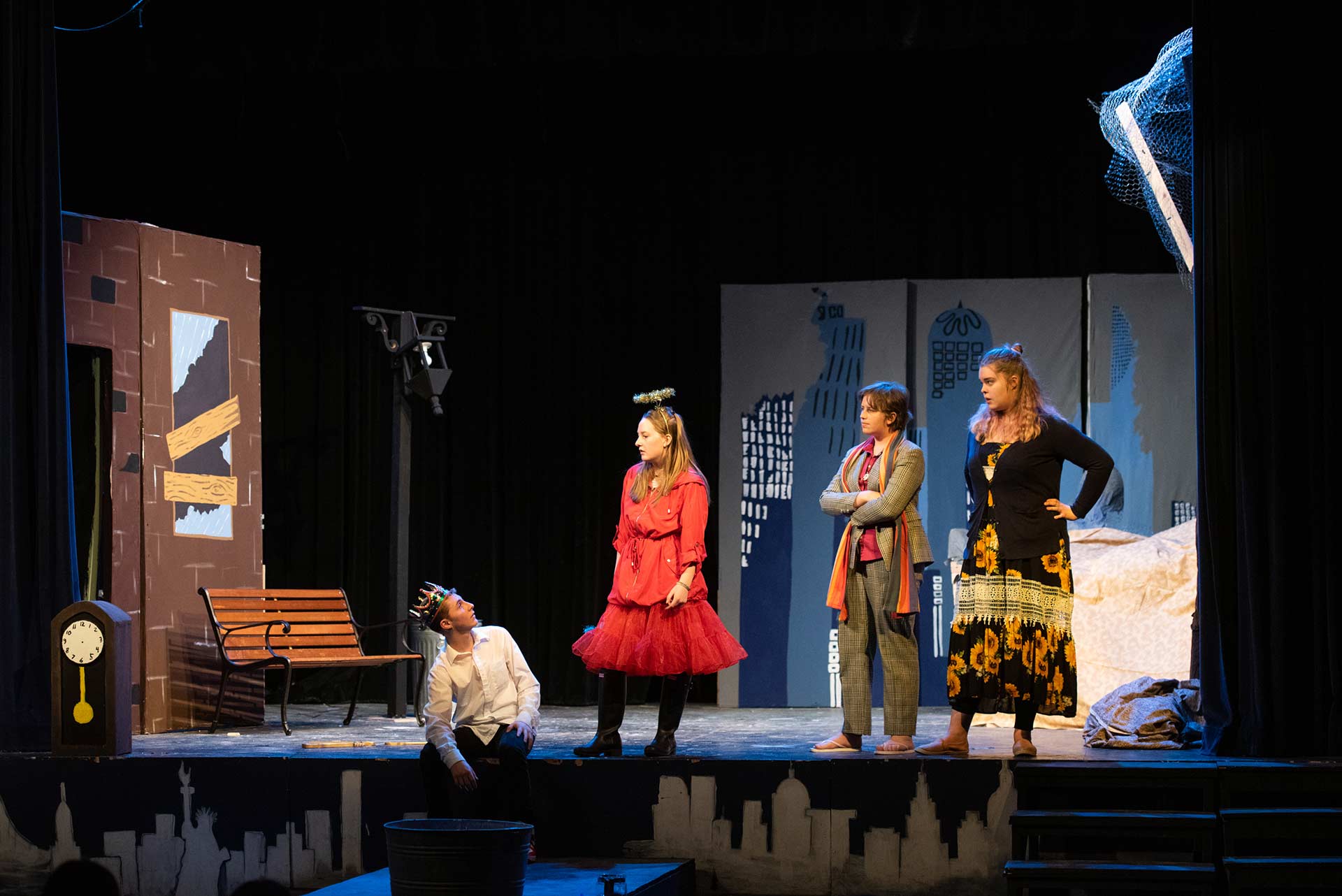
Denver Waldorf Teacher Spotlight - Mariko Murase
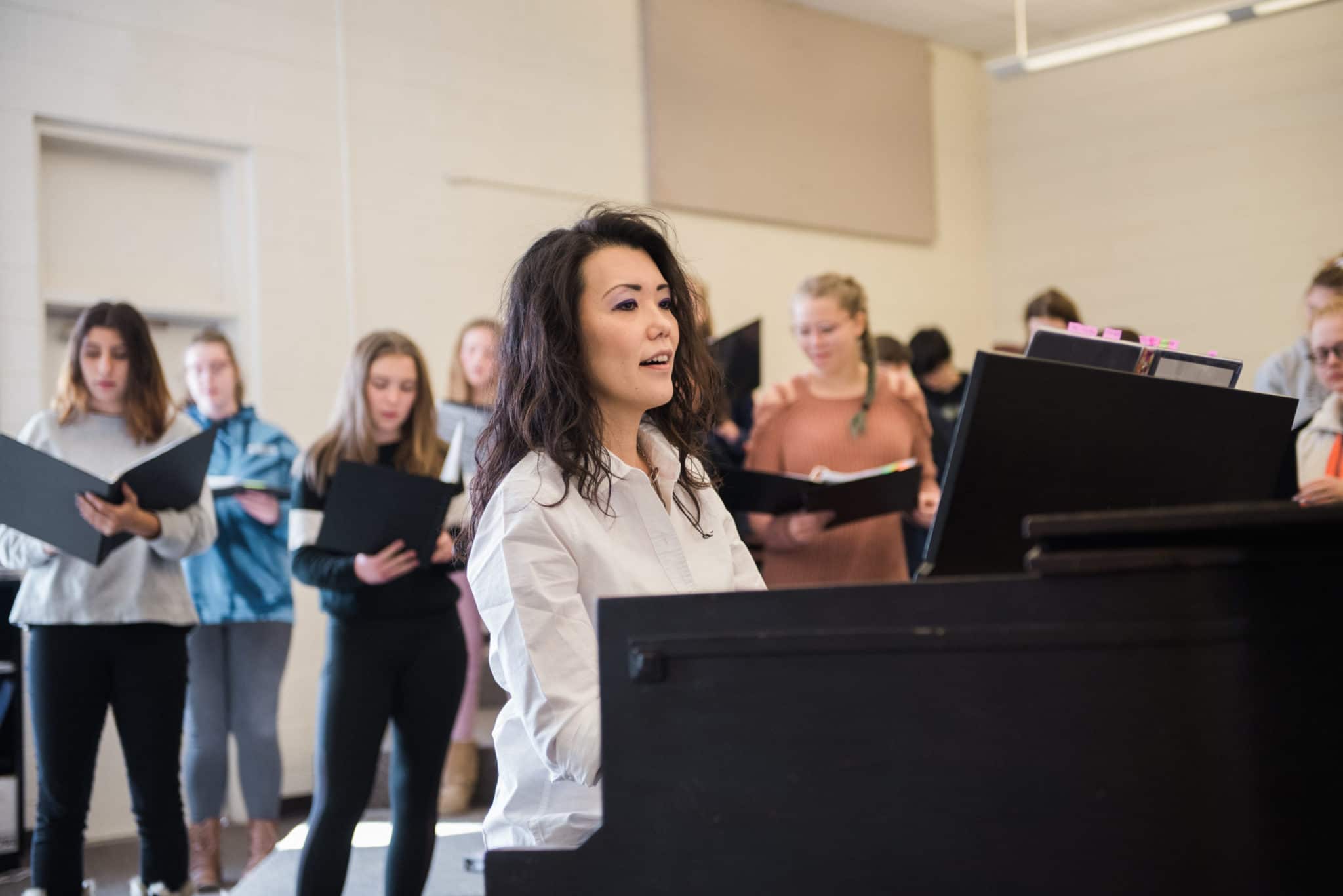
When students at The Denver Waldorf School are asked what they love about their education, they often comment that they treasure their close relationships with teachers. They are full of gratitude to be surrounded by caring, dedicated and inspiring teachers.
Our Teacher Spotlight series highlights a new teacher each month. This month, let’s get to know Mariko Murase.
What grades and subjects do you teach?
I teach Middle School and High School Choir – this is my dream job! It is a joy for me to hear beauty come alive in our collective voices.
What is your educational background?
As an undergraduate, I earned a bachelor’s degree from Nagoya University of Arts in Japan for Performance Piano with a minor in Vocal Performance. Upon moving to the United States, I earned a master’s degree in Performance Piano from the University of Denver.
What were the next stops on your journey prior to coming to The Denver Waldorf School?
Upon graduating from DU, I began working as a piano accompanist with The Denver Waldorf School as well as at Shining Mountain Waldorf School, Tara Performing Arts High School, Rocky Mountain Children’s Choir, The DU Men’s Choir, Graland Country Day School, Kent Denver School and Stanley British Primary School.
How many years have you taught at The Denver Waldorf School?
I joined the Music Department at DWS in 2006 and became the Choir Director in time for the 2019-2020 school year.
What drew you to the Waldorf curriculum?
I love how the Waldorf approach focuses not only on the mind, but also on the heart and hands. Music has a way of engaging our hearts that brings our spirits alive while also connecting us to one another in a beautiful way. I also appreciate that music is an integral part of Waldorf education from the very beginning of a child’s journey. And it’s not just in the music room that you hear music – it’s everywhere! Wander through our hallways and you’ll hear singing, wooden flutes and string instruments adding warmth and culture to our students and our community.
What is your teaching philosophy and approach?
When it comes to teaching music, it is important to me that my students are exposed to a wide variety of genres and musical styles as artistic diversity is essential for creating both an aesthetic and cultural perspective. Additionally, it is important to remember that it takes time and discipline to accomplish something meaningful in class. Put simply, if you want to be good at it, you must work at it. However, it’s just as important to enjoy the experience – we try to have a lot of fun in class together!
The Waldorf philosophy of education focuses on the whole child. What does this mean to you?
This means going beyond academic pursuits and thinking more holistically about a student’s development. That is, inspiring the students’ natural creativity and imagination is essential – not just in music or art, but in all areas of learning. To learn not only how to think critically, but to also feel and act with care, creativity, compassion and enthusiasm.
What makes The Denver Waldorf School unique?
DWS goes above and beyond to create a supportive environment for students and families at every developmental phase of a child’s learning, from nursery school through high school.
This year has been a wonderfully positive experience for me and I feel grateful that I get to spend my days in such a passionate community of students, colleagues and parents.
To see our High School Choir in action, click here to listen to the National Anthem performed at our High School basketball game!
Denver Waldorf Teacher Spotlight - Nathan Ballenger
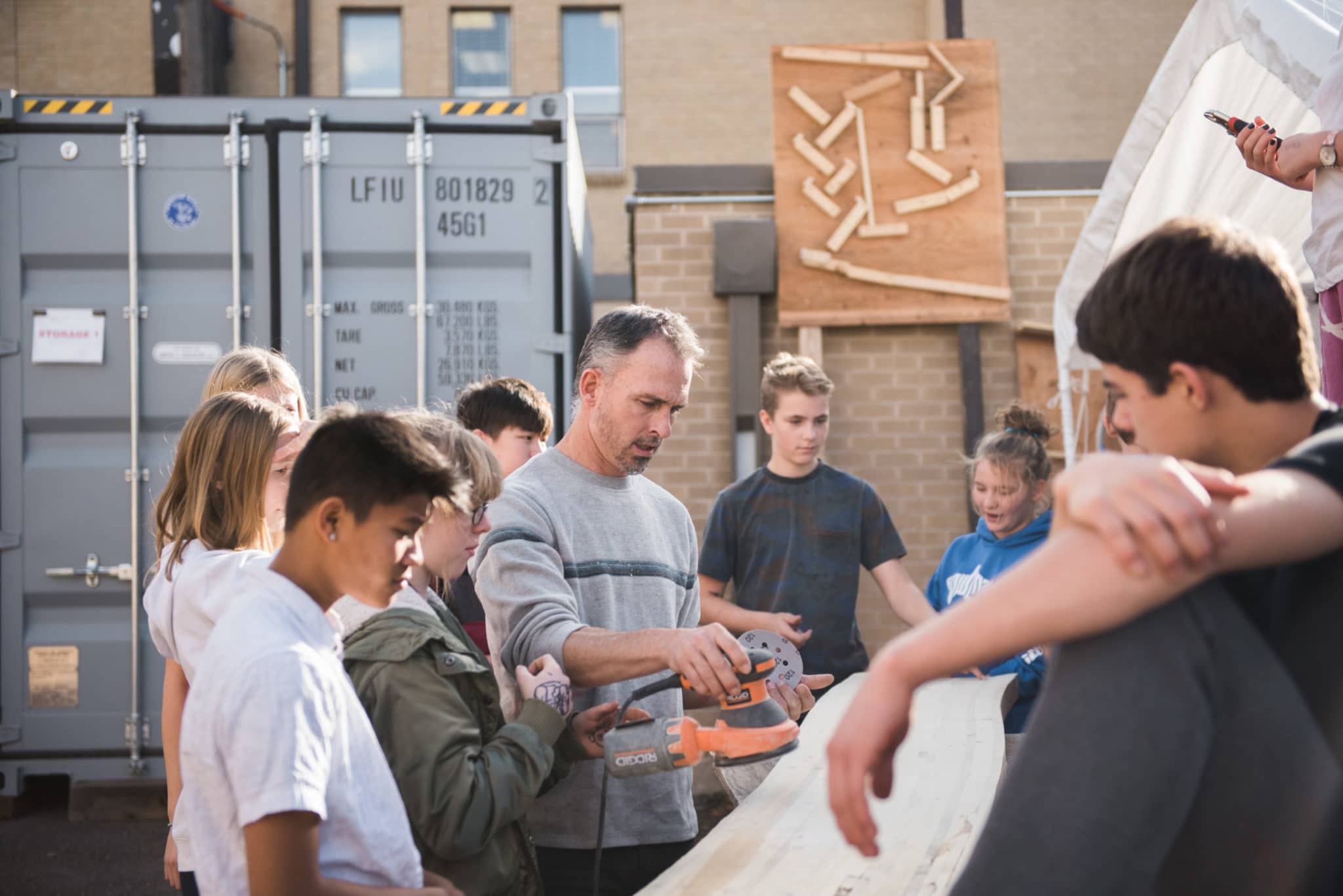
When students at The Denver Waldorf School are asked what they love about their education, they often comment that they treasure their close relationships with teachers. They are full of gratitude to be surrounded by caring, dedicated and inspiring teachers.
Our Teacher Spotlight series highlights a new teacher each month. This month, let’s get to know Nathan Ballenger.
What grades and subjects do you teach?
STEAM and Math: 6th grade through 8th grade.
Circus Club: 2nd grade through 8th grade.
What is your educational background?
I have a BS from Fort Lewis College in Durango, Colorado. I majored in Biology, minored in Chemistry and Psychology. I am also a Certified Energy Auditor.
What were the next stops on your journey prior to coming to The Denver Waldorf School?
I lived in India and traveled throughout the world before, during and after college. My travel and global community were deeply impactful of my journey. I have been to the home of the Dalai Lama, to the Old City of Jerusalem, to the jungles of the Quichua people in Ecuador and Peru, to the jungles of Chiapas and to Copper Canyon where the Tarahumara reside. I have hiked the Himalayas, the Andes and the Rockies. I traveled with a circus troupe in Ecuador doing acrobalance and clowning, as well as performed in circus on the streets of Delhi. All of these experiences have greatly contributed to who I am today.
My first job out of undergraduate school was as an air quality specialist for La Plata County in collaboration with the Colorado Air Pollution Control Division. I also sat on the Four Corners Ozone Task Force executive board, and worked directly with the Southern Ute Tribe emissions testing.
I then taught at Mancos Valley Independent School, a Waldorf school, as a 3rd grade co-teacher, Spanish teacher and games teacher.
I also owned and operated two companies- NRG By Design and Second Harvest Builders. NRG By Design provides services in energy efficiency auditing, analysis, design and construction. Second Harvest Builders is a custom home builder specializing in natural and alternative building techniques such as straw-bale construction, natural clay and lime plasters, reclaimed materials and conventional building practices.
Finally, I worked as a search-engine marketing consultant as well as at Tesla in solar design and consulting.
How many years have you taught at The Denver Waldorf School?
This will be my third year teaching, and my second year at The Denver Waldorf School. I also sat on the Mountain Phoenix Community School governing board for three years.
What drew you to the Waldorf curriculum?
I co-taught with Marian Barton at the Mancos Valley Independent School from 2004-2005. This experience influenced my entire parenting experience, and has been a part of my life ever since. My wife is a certified Waldorf teacher and Early Childhood Specialist. Waldorf curriculum and anthroposophy have been a big influence on my worldview for about 15 years.
What is your teaching philosophy and approach?
My number one goal is to generate enthusiasm and interest in all of my students for the subject matter, for learning and for life. This requires knowing each of my students individually, as well as knowing my class as a community. Each class is unique and requires different methods and creativity in the ways you approach teaching.
Middle school is a time when the children are beginning to look out into the world, in a way, for the first time. Prior to middle school, the children are focused inward, to their own self, their immediate community and family. In middle school, this shifts, and the children begin to look out toward their teachers, their peers and the world around them with interest and curiosity. This usually involves testing, trying things out, using different forms of communication etc. I try every day to pay special attention to what the children are seeking, asking for and excited about. This is ever-changing and shifts with the individuals and nature of the class.
As a teacher, my focus is to be flexible within that change, and to teach to the class in front of me at that moment. Not to teach to the class last week, or the class I think we should have. Middle school requires flexibility, creativity and an open mind. All of that said, I have an agenda including includes goals and expected outcomes. As the teacher, I show up well-prepared and ready to accomplish my goals with the class in order to prepare them for maximizing their own potential in academics and in life. I try to give them all the tools and experience I can muster while making sure they feel supported, loved and encouraged.
The Waldorf philosophy of education focuses on the whole child. What does this mean to you?
The whole child in short is the head, the heart and the hands. As a Waldorf teacher, we learn to understand what is developmentally appropriate for children in each phase and year of their growth and development. Teaching to the whole child means that learning involves a lot more than just memory. Not only do children learn differently as they grow, but each of them also learns differently through various methods of teaching. Experiencing the sensation of sawing wood with a fine-tooth saw and a large-tooth saw teaches a relationship with wood and tools in a way that words and pictures cannot reproduce. Some children learn well through hearing, some through seeing, some through experiencing and some through expressing.
Teaching the whole child means that we are using all of these methods with purpose. To teach to the whole child, I use multiple techniques, and I also pay special attention to what each child is going through and needing as they grow. Getting to know the students is learning about the whole child that I must teach to. This takes time, effort and mediation daily.
What makes The Denver Waldorf School unique?
The Denver Waldorf School is full of history. The faculty brings decades upon decades of experience. This rich soil of experience provides a deeply enriching environment for both students and new teachers who are fortunate enough to find their home at DWS. Our school is the product of this faculty experience as well as of many DWS families stretching back 45 years in the Denver area. I witness this wealth of history and experience in every faculty meeting, in the hallways we all pass through, and in the children who are impacted by it all. DWS is a special place because of the spirit of all who have been here and of all who are here today.
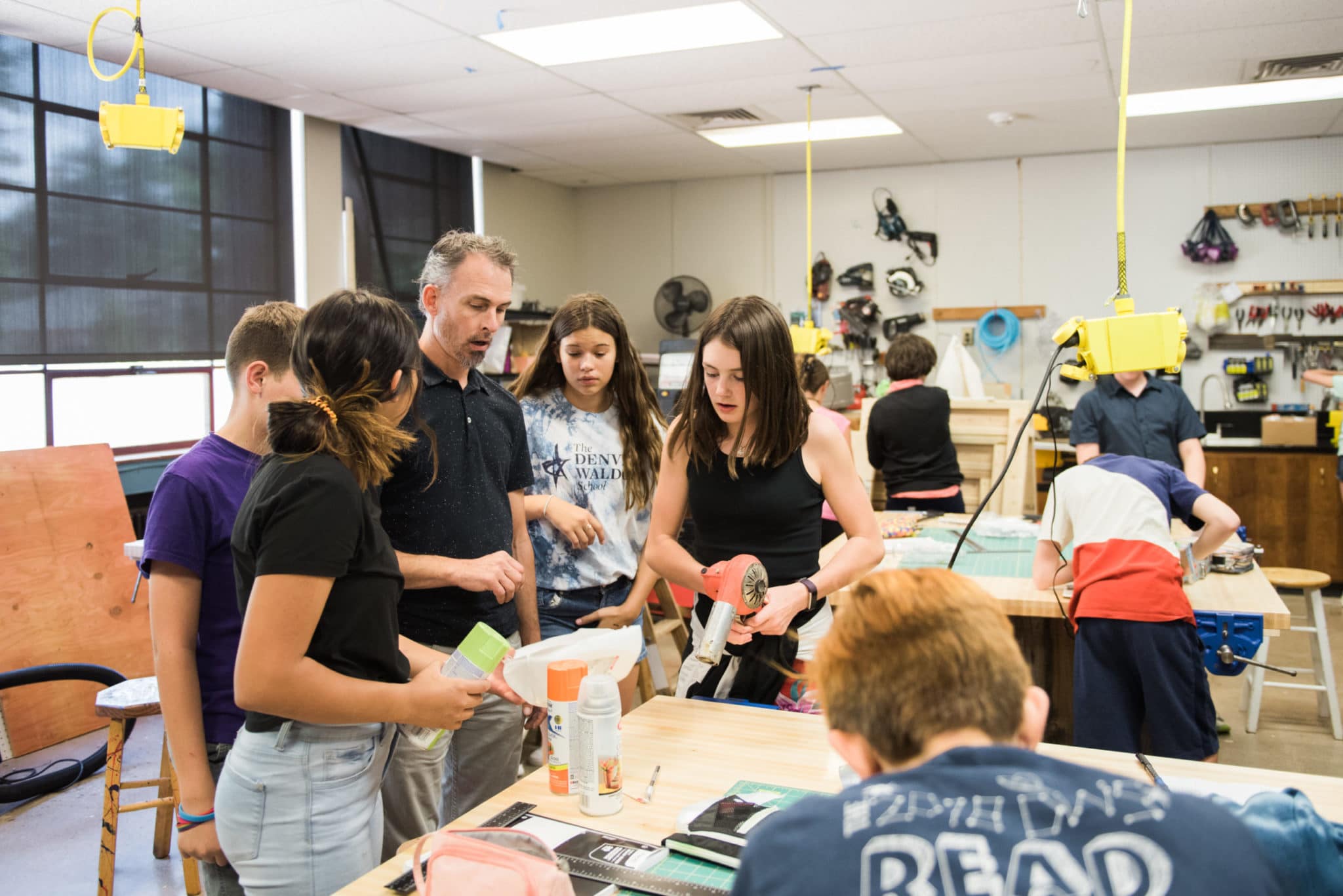
Pictured in the new STEAM classroom
Denver Waldorf Teacher Spotlight - Dr. Wayne Mayer
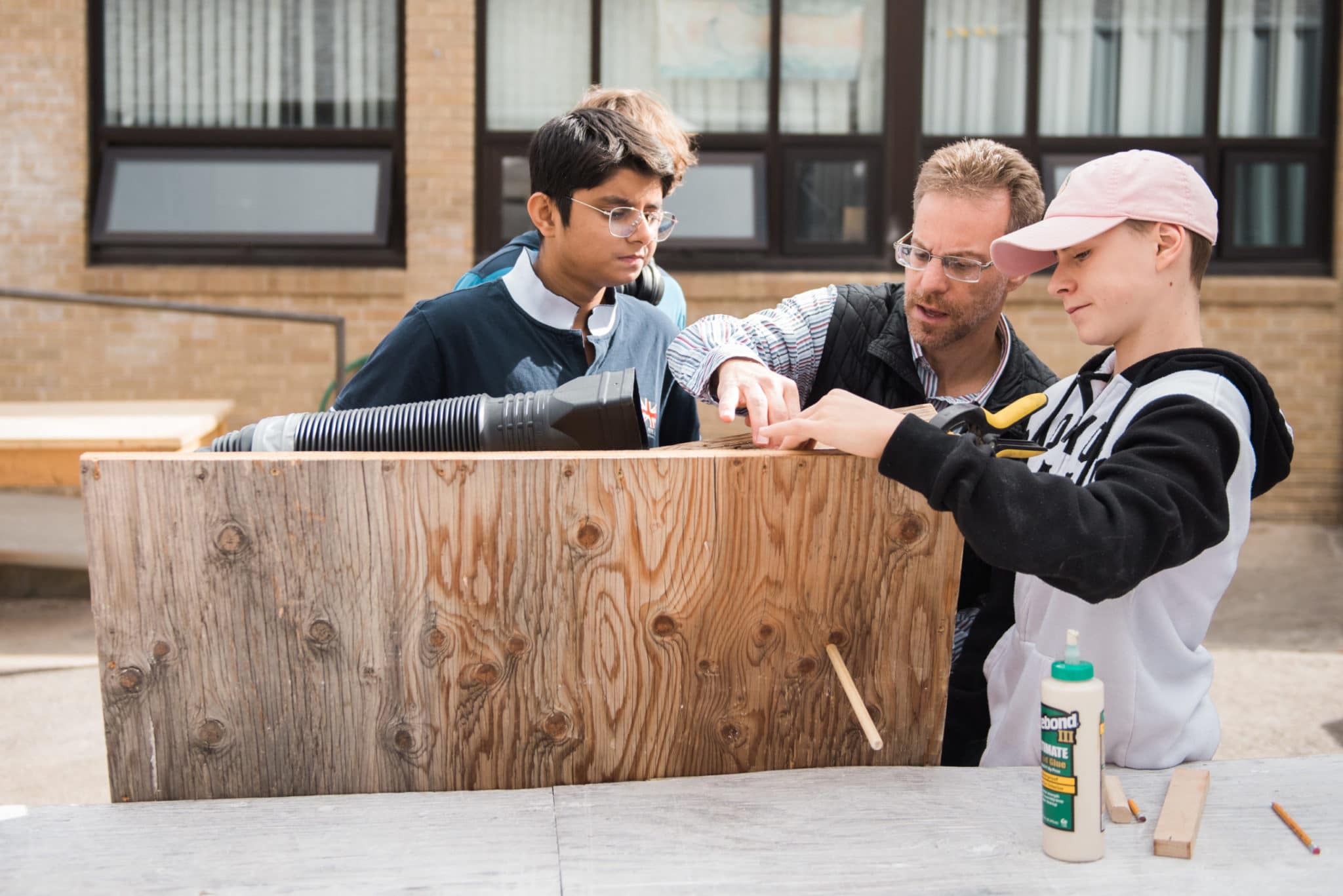
When our students are asked what they love about their education at The Denver Waldorf School, one answer we hear frequently is that they treasure their close relationships with teachers. They are full of gratitude to be surrounded by caring, dedicated, and inspiring teachers. Our Teacher Spotlight series highlights a new teacher each month.
Let’s get to know Dr. Wayne Mayer below.
What grades and subjects do you teach?
I teach the high school’s Life Science courses along with two electives, including:
Human Anatomy – 9th Grade
Organic Chemistry (9th Grade)
Human Physiology (10th Grade)
Acids, Bases, and Salts (10th Grade)
Acids, Bases, and Salts Lab (10th Grade)
Atomic Chemistry (11th Grade)
Atomic Chemistry Lab (11th Grade)
Botany (11th Grade)
Embryology (11th Grade)
Human Sexuality (11th Grade)
Biochemistry (12th Grade)
Planet Earth (12th Grade)
Zoology (12th Grade)
The Science of Simple Tools – elective
The Culture of Peru Through Food – elective
What is your educational background?
PhD, December 2006 Environmental Science & Policy Duke University, Durham, NC
Graduate Certificates: International Development Policy; Latin American and Caribbean Studies
MS, June 1994 Forestry & Ecology University of Washington, Seattle, WA
BA, June 1991 Environmental Science, cum laude, University of Denver, Denver, CO
Double Minors: Anthropology; English Literature
What was the next stop (or stops) in your journey before coming to The Denver Waldorf School?
I lived in Latin America where I worked as an educator, a journalist, a conservationist, a research scientist, and a sustainability and sustainable development consultant.
As a consultant, I led a wide range of clients in situations that were often complex, technical, contentious, multi-disciplinary, and involved varying numbers of people from small focus groups to large strategy summits. I guided clients to transform “Us vs Them” dynamics into “All of Us” alliances.
How many years have you taught at The Denver Waldorf School?
This is my first-year teaching at The Denver Waldorf School, but I have been teaching at the university level for over 25 years. From 1996 to 1998, I served as the Academic Director for the School for International Training (SIT) College Semester Abroad Program in Venezuela. Currently, I hold visiting faculty appointments at both the University of Denver and Duke University.
What drew you to the Waldorf curriculum?
I like the integrated, holistic approach to teaching and learning.
What is your teaching philosophy and approach?
The best learning—whether through formal and rigorous academics or informal and playful dialogue—occurs through what I call “fun with a purpose.” As the former Academic Director for the School for International Training’s College Semester Abroad Program in Venezuela, I know that communication through stories proves useful in field-based teaching and in communicating the concepts of biological conservation to communities and project participants. For example, if a student is listening to a story and is enthralled and laughing and then, suddenly, she realizes that this story is about the reproductive biology of a palm species or the mating habits of an endangered tree frog, she’ll likely think that learning about nature and science shouldn’t be this much fun. I aim for that reaction. I also strive to inspire students to ask the overarching questions: Why is that? Why does this matter? I address these questions at the onset of a block; then, throughout the course, I do my best to express my own excitement and interest in the subject at hand. Together, my students and I search for answers. In doing so, I hope to teach and to learn more about both the wonder of nature and the urgent need to conserve it.
The Waldorf philosophy of education focuses on the whole child. What does this mean to you?
Teaching the whole child means tapping into the student’s internal inspiration—understanding what motivates that child—and teaching and learning through an integrated combination of social, emotional, and academic connections. This triangulation of head, heart, hands or mind, body, spirit, means bringing art, nature and movement into the attraction, appeal and relevancy of learning.
What makes The Denver Waldorf School unique?
The enthusiastic teachers and administrators make The Denver Waldorf School a one-of-a-kind place to teach and learn.
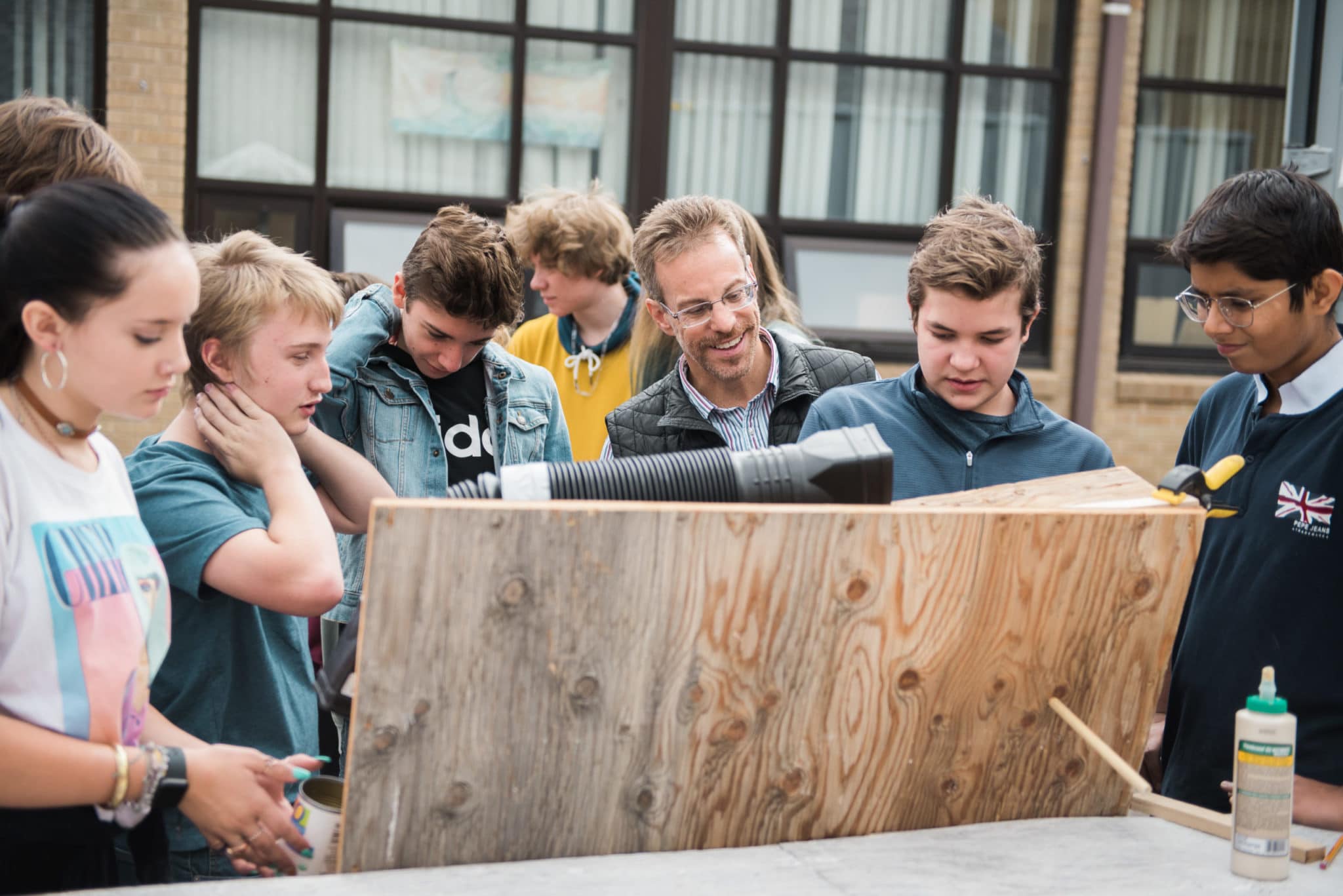
Dr. Wayne Mayer pictured with students building a Rube Goldberg machine during the elective of “The Science of Simple Tools”.
